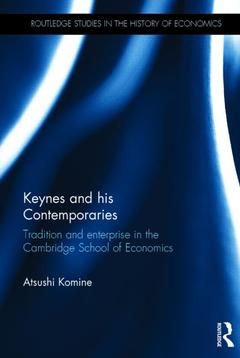Description
Keynes and his Contemporaries
Tradition and Enterprise in the Cambridge School of Economics
Routledge Studies in the History of Economics Series
Author: Komine Atsushi
Language: English
Subject for Keynes and his Contemporaries:
Keywords
cambridge; school; economics; tripos; Paper III; marshallian; Vice Versa; tradition; CW; frederick; Moral Enhancement; lavington; National Development Programme; economic; Economic Journal; chivalry; Florence Ada Keynes; Saving Investment Analysis; McWilliams Tullberg; Modern Languages; Marshallian Tradition; Economics Tripos; Cambridge School; Economic Chivalry; Marshall’s Pupils; Semi-autonomous Body; Special Board; Unspent Margin; Short Term Abnormalities; Joint Control; Keynes’s Efforts; Liquidity Preference; Skilled Speculators; Pure Credit System
Publication date: 05-2014
Support: Print on demand
Publication date: 04-2017
· 15.6x23.4 cm · Paperback
Description
/li>Contents
/li>Readership
/li>Biography
/li>
This book examines how the Cambridge School economists, such as J. M. Keynes, constructed revolutionary theories and advocated drastic policies based on their ideals for social organizations and their personal characteristics. Although vast numbers of studies on Marshall, Keynes and Marshallians have been published, there have been very few studies on the ?Keynesian Revolution? or Keynes?s relevance to the modern world from archival and intellectual viewpoints which focus on Keynes as a member of the Cambridge School. This book approaches Keynes from three directions: person, time and perspective.
The book provides a better understanding of how Keynes struggled with problems of his time and it also offers valuable lessons on how to survive fluctuating global capitalism today. It focuses on eight key economists as a group in ?a public sphere? rather than as a school (a unified theoretical denominator), and clarifies their visions and the widespread beliefs at the time by investigating their common motivations, lifestyles, values and habits.
Preface Introduction: Marshall and his disciples 1. Robertson and Appropriate Control of Industry 2. Two Types of Dealers in Hawtrey’s Economics 3. The "Conversion" of Henderson 4. Lavington on Effective Entrepreneurship 5. Keynes and the Revision of the Economics Tripos 6. Keynes and Women’s Degree 7. Keynes and Semi-autonomous Bodies Conclusion: Keynes’s Traditional and enterprising thought




